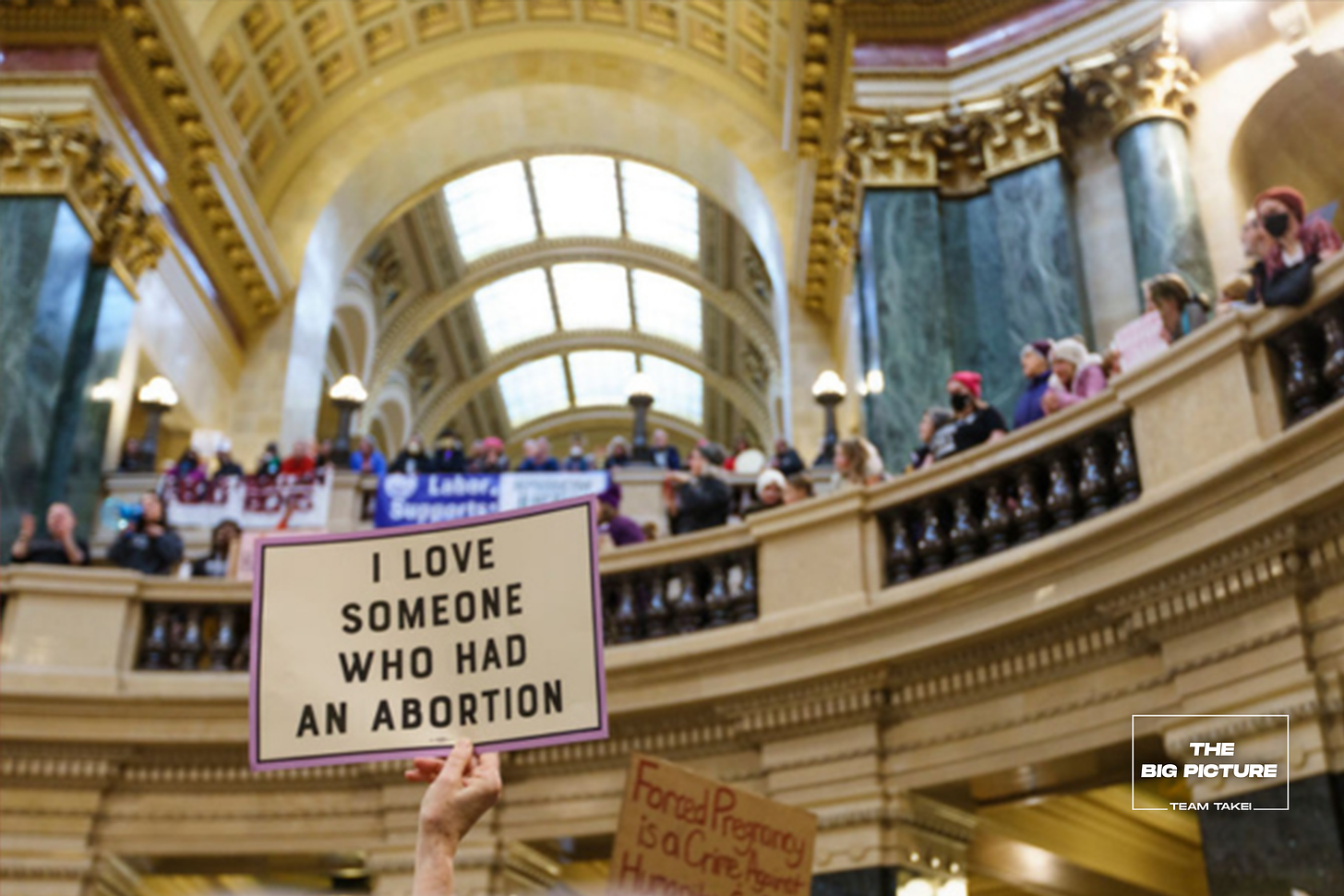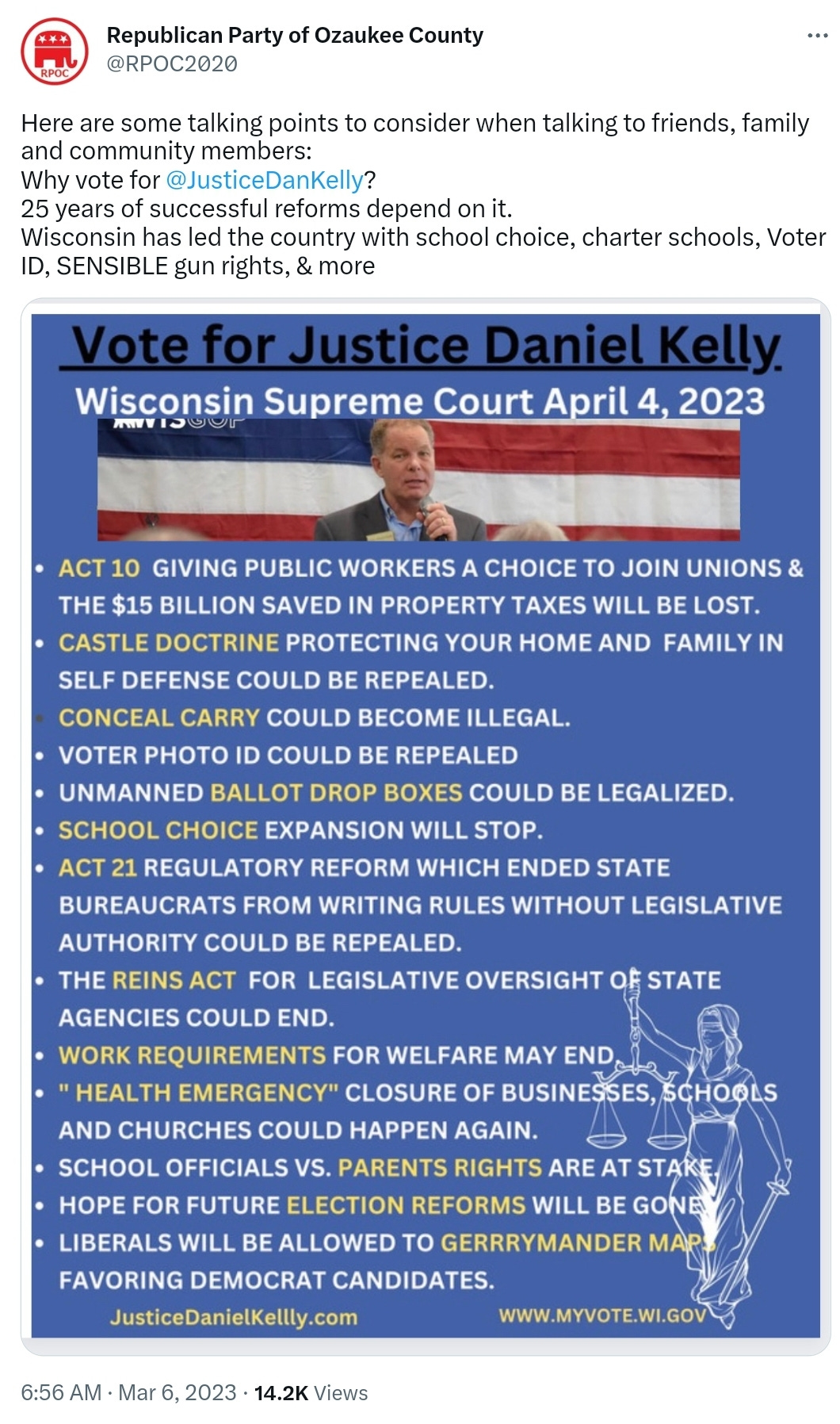Reproductive Freedom and Democracy Face a Critical Test in Wisconsin on Tuesday
On Tuesday, April 4, reproductive and democratic freedoms are on the ballot as Wisconsinites head to the polls to decide a crucial state Supreme Court election.

Wisconsin, the purplest of the purple states, is a national bellwether—one that often even seems to determine our nation’s entire political future.
Without Wisconsin, it’s difficult for either political party to reach the magic 270 electoral college votes needed. And yet the state balances on a political knife’s edge.
In the last two presidential elections, Wisconsin was decided by less than one percent.
In the 2022 midterms, Wisconsin Republican Senator Ron Johnson also won his reelection race by a narrow one percent. Had he been defeated, Democrats would have had the votes needed to end the Senate filibuster.
Now we’re stuck with him for another six years.
In just a few days, critical rights and freedoms will be on the line again in the “Forward” State. And how that vote goes could shape the state and our national politics for a generation.
Will Wisconsin go “forward” or keep us stuck in a backward-facing nightmare? That election is today’s subject in The Big Picture.
— George Takei
A pivotal state Supreme Court election will be held on Tuesday, April 4 in Wisconsin.
National political leaders from both parties are watching this contest closely for what it may portend for the direction of the country, particularly when it comes to reproductive freedoms and basic democratic rights.
Abortion and other fundamental rights are on the line.
After the Supreme Court issued its Dobbs decision overruling Roe v Wade last year—eliminating a federal right to privacy concerning reproductive healthcare that had stood for 50 years—each state was left to make and enforce its own abortion laws.
Many red states had already put abortion “trigger” laws in place that would leap into effect the moment Roe was overturned, while many blue states rushed to pass additional protections to guarantee the right to abortion access.
And Then There Was Wisconsin
The law criminalizing abortion care in Wisconsin dates back to…*checks notes*...1849.
With Roe and its protections gone, a long-dormant law is now the default controlling statute for abortion in Wisconsin. And that 174-year-old law essentially bans all elective abortion procedures in the state.
The state’s Democratic Attorney General has filed a lawsuit challenging the law, arguing that more recent laws passed in the 1980s should override the 174-year-old statute, which hasn’t been enforced in decades.
That lawsuit will ultimately reach the Wisconsin State Supreme Court.
The case is now making its way through Wisconsin’s lower courts and is expected to eventually come before the state Supreme Court, which currently has a 4-3 conservative majority.
But one of those conservatively-held seats is up for grabs with the announced retirement of Justice Patience Roggensack this summer.
The special election to succeed Roggensack is set for Tuesday, April 4. Progressives, including abortion rights activists, see a chance to flip the court their way by a single vote. And potentially restore abortion access in the state.
Wisconsin Democrats Are Fired Up
If the recent primary election—which was open to all regardless of political party affiliation—is any indication, the left stands poised to retake control of the state high court’s majority.
The February primary for the soon-to-be vacant state Supreme Court seat saw the top liberal candidate—Judge Janet Protasiewicz—garner 46.5% of the vote in the 4-way contest. Notably, she earned more votes than the two conservative candidates combined.
Protasiewicz has made abortion access central to her campaign. Her overwhelming success in the primary indicates Dobbs continues to motivate left-leaning voters.
Turnout in Wisconsin’s Democratic strongholds in Dane and Milwaukee Counties was surprisingly strong for an off-year judicial election. In Dane County, turnout was 40% of the number that turned out for the 2020 presidential election—just 29% showed up for the 2022 midterms.
Protasiewicz is a former assistant district attorney who has served on the Milwaukee County Circuit Court since 2014. She will face off against former state Supreme Court Justice Daniel Kelly in Tuesday’s run-off.
Kelly, a staunch conservative, was appointed to the court by former Republican Governor Scott Walker in 2016. The Trump-endorsed conservative then lost his reelection bid for the seat by 11 points in 2020.
Kelly's loss shifted the court’s ideological makeup from 5-2 conservative to just 4-3.
Now conservative Kelly wants back on while progressive Protasiewicz hopes to swing the court to a 4-3 liberal majority—something Wisconsin hasn’t seen in 15 years.
It is quite telling that outgoing conservative justice Pat Roggensack has not endorsed Dan Kelly in the race to replace her.
However, her daughter Ellen Brostrom—who herself is a state judge—endorsed Protasiewicz.
And she penned a powerful takedown of Kelly as she threw her weight behind his opponent.
A Protasiewicz Win Could Impact Abortion Policy Statewide
Prior to the Dobbs decision, abortion had been legal in Wisconsin up to 20 weeks. But now the archaic abortion law still on the books from 1849 bans all abortions except for “therapeutic abortions.”
Because that term is vague, doctors must assess their own legal risks when performing abortions they perceive to be in the interest of saving the life of the mother.
According to Wisconsin Watch, violating Wisconsin’s 1849 law is considered a Class H felony, punishable by up to six years of combined prison and extended supervision and a $10,000 fine.
Whether doctors would actually be charged under this law remains uncertain and seems to depend on where in the state one resides.
For example, Republican district attorney for Sheboygan County Joel Urmanski confirmed he will pursue prosecution against doctors if there’s evidence they intentionally violated the law. But Democratic prosecutors in Dane and Milwaukee Counties announced they will not pursue prosecutions for abortions.
While state Supreme Court elections are technically nonpartisan, Protasiewicz made clear she supports abortion rights and is endorsed by Planned Parenthood and EMILY’s List—a group that supports pro-choice Democratic women candidates. If she wins on April 4, all four members of the court’s liberal majority will be pro-choice women.
Protasiewicz won’t say how she will rule if the 1849 law does come before her as a justice, preferring to only articulate what her values are.
It is assumed her opponent Daniel Kelly would side with conservatives in keeping the archaic law in place. He has been endorsed by Wisconsin Right To Life, Wisconsin Family Action and Pro-Life Wisconsin.
The stakes could not be clearer.
Democracy Itself Is Also on the Ballot
As Protasiewicz made clear on the campaign trail, this election is not solely about abortion rights, it’s also about democracy itself.
"We're saving our democracy in the state of Wisconsin. … I'm talking about the ability to vote, to have a vote that counts about women's rights, reproductive freedoms, the fact that the 2024 presidential election results could likely come into our Supreme Court chamber, just everything people care about."
When Republicans took over state government in 2011, they gerrymandered legislative districts to ensure they had perpetual power in the state legislature despite a fairly even partisan split among the state’s voters.
And it is expected the state Supreme Court will get the chance to rule on those pro-Republican district maps, which Protasiewicz has made clear she opposes.
As Ben Wikler, chair of the Wisconsin Democratic Party put it:
“If Republicans keep their hammerlock on the State Supreme Court majority, Wisconsin remains stuck in an undemocratic doom loop.”
In addition, this election comes less than three years after Donald Trump’s attempt to throw out 200,000 votes to overturn the will of Wisconsin voters during the 2020 election. The only thing that stood between Trump and his goal of disenfranchising wide swathes of mostly Black Wisconsin voters was a single vote on the state Supreme Court.
In the wake of the 2020 election, the Wisconsin State Supreme Court, through a series of 4-3 decisions, ultimately rejected Trump’s unlawful power grab.
But that was too close for comfort for Protasiewicz.
“What our Supreme Court did with the 2020 presidential election kind of turned people’s stomachs. We were one vote away from overturning the results of the 2020 presidential election.”
Meanwhile, Judge Protasiewicz’s opponent Dan Kelly was paid more than $100,000 to consult with the RNC on Trump’s plan to overturn the 2020 election results via his slate of fake electors.
The GOP Needs Bad Maps to Win
Republicans understand that the loss of their gerrymandered maps could spell the loss of their control of the legislative process.
This happened to neighboring Michigan’s GOP after voters passed a referendum for fair maps. Michigan was once drawn to ensure a GOP majority in the legislature.
But in 2022, after a free election under fair maps demanded by the voters, Democrats now hold a trifecta in the state house, senate, and governorship there.
A similar Democratic trifecta was elected to power on Wisconsin’s other side in the state of Minnesota.
As a result, local Republicans are rightfully afraid their entire agenda is on the line with Tuesday’s election because it could end their ability to gerrymander forever.
One local WI GOP group made clear what the stakes of this election are for them:

It’s actually a pretty good distillation of all the reasons Wisconsin voters should support Janet Protasiewicz on Tuesday.
Vote or Urge Others to Do So on April 4.
If you are a Wisconsin voter—or if you know anyone who is—this is a reminder that early voting is currently underway.
You can find your polling place here.

Polls will be open for election day voting from 7am to 8pm on Tuesday, April 4. And if you’re not yet registered, you can still register to vote either in person at your local municipal clerk’s office by March 31, or at your polling place on election day. All details can be found here.
Turnout and enthusiasm are what win special elections.
While there has not been any public polling in this race, private polling, strong Democratic fundraising, and signs of high enthusiasm among left-leaning voters seem to point to a Protasiewicz win on Tuesday. But as UVA’s Center For Politics reminds us, that’s what they said back in 2019 as well.
In the 2019 state Supreme Court race, liberal judge Lisa Neubauer was seen as a tenuous favorite but lost to now-Justice Brian Hagedorn, a conservative, by fewer than 6,000 votes. The 2019 result is reason enough to not rule out a conservative win this time.
Special elections are tricky things, and Democrats traditionally have underperformed in low-turnout elections. So, let’s reverse that trend and help Janet Protasiewicz win on Tuesday.
Abortion rights and democratic freedoms depend on it.






Even conservatives/Republicans have to be taken by the fact that two of their own--Justice Roggensack and her daughter, Judge Brostrom, are either supporting Judge Protasiewicz or refusing to support Judge Kelly. That speaks volumes.
Just read that judge in (where else) Texas struck down part of Affordable Care Act saying do not have to cover birth control, preventive care from cancer to chronic disease screening.. anything recommended by Preventative Service Task Force. Said it is unconstitutional. Brought by Christian (?) business.